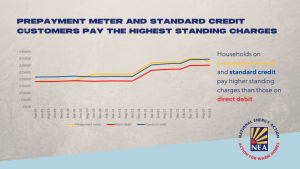Today Ofgem announces a paper on standing charges – it covers your energy supplier’s costs such as connecting gas and/or electricity to your home.
Peter Smith from fuel poverty charity National Energy Action (NEA) comments:
‘For years, there has been growing alarm about increases to standing charges. Many people rightly feel they are now too high and the current approach is unfair. How can it be right that someone who can’t afford any energy for their home, still pays a daily charge that is the same or more than someone in a mansion? An overhaul of the system is long overdue.’
National Energy Action says that since the start of the [default tariff] energy price cap, on average, standing charges have increased by over 65% since April 2019. They also note that despite a recent small reduction, low-usage households on prepayment meters have been hit even harder. Despite many people on prepayment meters cutting their energy usage to the point it could be dangerous to their physical or mental health, charges for these customers have almost doubled over the same period. Given the extent of public concern with these issues, the charity says the review will be on borrowed time to produce some fairer outcomes, but reforms will be complex and could create winners and losers. While Ofgem works through the issues, National Energy Action says the UK government can intervene this winter.
Peter Smith adds:
‘Standing charges aren’t just a matter for the energy suppliers or the energy regulator. How much people pay is often due to government policy. If there was the political will to prioritise these issues in the Autumn Statement, the UK Government could cut standing charges to zero for prepayment customers this winter. This would particularly benefit those who are more likely to have missed out on support last winter like the £400 discount Energy Bill Support Scheme and who are much more likely to in debt or struggling now to afford their bills. In the longer term, more policies should be paid out of taxation and Ofgem should be encouraging suppliers to reflect a customer’s usage when they recover these charges, or a customer’s payment method, which fuels they use, or their ability to pay.’
National Energy Action’s Head of Wales, Ben Saltmarsh, comments:
Beyond the overall increases to standing charges, where you live also has a big impact on how much you pay. People in North Wales and Mersey pay a third more a year than Londoners. How can it be fair that areas across Great Britain that are more likely to struggle with their bills, pay so much more? The review needs to recognise these areas are being hit hard by the wider cost of living and there should be a clear focus on reducing or eliminating these regional variances.”

Note for journalists: If this goes online please link to www.nea.org.uk/energy-crisis.
If it goes on Twitter/X or Threads, please include @NEA_UKCharity











